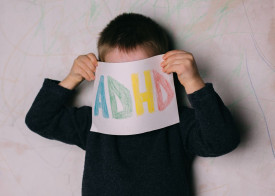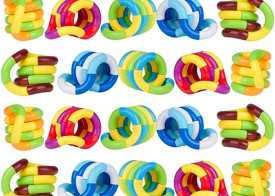
Why does my child like to chew?
Biting or chewing hard objects is part of stimming behaviours in autism spectrum disorder (ASD). Stimming is a self-regulatory mechanism for people with ASD to cope with anxiety. Chewing and sucking help them to self-soothe, so it’s a strategy that children and adults use to help to calm themselves down if they’re experiencing sensory overload. Because the jaw is one of the most powerful muscles in the human body, chewing gives the brain a big hit of proprioceptive sensory input.
Children sometimes want to chew, lick, bite, or suck on non-edible items in an excessive manner. This is referred to as oral sensory-seeking behaviour. If your child likes to chew on non-food items, such as clothing, toys, or pencils, it’s important to address the behaviour to prevent damage to their teeth and gums. Here are some tips to help you manage your child's chewing habits:
Provide appropriate chew toys
Chew toys are designed for children to safely chew on and can help to satisfy the urge to chew. There are different types of chew toys available, such as those that are firm or flexible, and have different textures to suit different needs.
Limit access to non-food items
To prevent your child from chewing on items that are not safe, it’s important to keep these items out of reach. This might mean storing pencils and other items out of reach, or supervising your child closely when they are playing with such items. It might be a good idea to replace them with sensory toys as a distraction or a different focus to deter their biting.
Address underlying issues
Children may chew as a coping mechanism for underlying issues such as anxiety, ADHD, or sensory processing disorder. If your child's chewing habits seem excessive, it's important to speak to a doctor or paediatrician who will help guide you to additional resources like speech therapy or occupational therapy.
Positive reinforcement
If you notice your child trying not to chew or avoiding certain objects that trigger their chewing, give them positive encouragement and reward them for their good behaviour. This could be done through a reward chart to help your child track their progress.
Offering alternative foods
Chewy and sour or minty snacks and sweets as well as foods may meet your oral sensory seeker's sensory needs. These foods give strong input to proprioception receptors in the mouth and can be helpful in preventing licking and biting.
Watch out for dental problems
Excessive chewing can cause damage to the teeth and gums, so it's important to monitor your child's dental health and schedule regular check-ups with a paediatric dentist. Helping your child manage their chewing habits can be a process that requires patience and consistency. By providing appropriate chew toys, limiting access to non-food items, addressing underlying issues, using positive reinforcement, and monitoring your child's dental health, you can help your child to manage their chewing habits in a healthy way.
Any tips we’ve missed? We’d love to hear, so contact us today.




